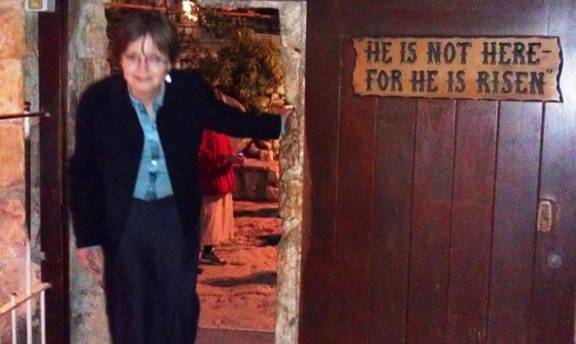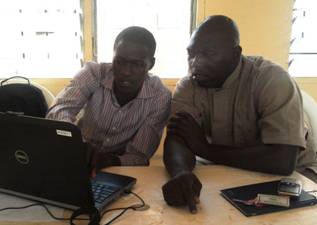David and Lynn Frank Easter 2014 newsletter
E ain yah. E done git op fom mongst de dead an e da lib gin, jes like e say. (Gullah) I pa isi-a. I wésisité hòd lanmò kon i té di. (Saint Lucian Creole) I ka sta li. I lanta di mortu, suma ki i fala. (Guinea-Bissau Creole)
| |||
“He is not here! He is risen, just as he said!” We have the privilege of helping others spread this message in their own languages where it has not been understood before; in January we had a special opportunity to visit the Garden Tomb in Jerusalem, which is supposed to be the very place where these things took place. We were part of a Holy Land tour for Bible translation consultants and saw so many places in our two weeks in Israel—from Dan to Beersheba, as the Bible says—including Bethlehem, Nazareth, Capernaum and the Sea of Galilee, the baptismal site on the Jordan River, ancient Jericho, Qumran and En Gedi on the Dead Sea, Masada, and Jerusalem and the nearby Mount of Olives. Translation Consulting in Nigeria—From Israel I went straight to Nigeria for three weeks, to work with speakers of a language called Bwaatye on their translation of Paul’s and John’s epistles. I had never been exposed to this language before arriving in Nigeria but worked with mother-tongue translators who could speak English and who helped me understand their language. I enjoyed working with Samaila and Samson and checked their Bwaatye translation of 1 & 2 Thessalonians, 1 & 2 Timothy, Titus, Philemon, 1, 2 & 3 John, and Jude. Checking 1 & 2 Thessalonians in Bwaatye—The first verse we checked in Bwaatye was 1 Thessalonians 1:1, which says, Bulu, Silvanu ka Timawu tənə kat dɨ wunakəunə hwun myee a vɨra Tasalonika avor kwakɨ Həmɨnpwa Baatə ka Həmə miye Yesu Ma Pwa Ngɨltən. Na pepetə ka ɗolta Pwa a nza kəunə ɓwa. In literal English this would be “Paul, Sylvanus and Timothy they all greet you believers in the town of Thessalonica in the name of the King of Heaven Father and the owner of people Jesus the One God Has Chosen. May the grace and peace of God sit with you.” You can see in this verse how names like Paul, Sylvanus (Silas), Timothy, Thessalonica and Jesus are rendered in Bwaatye. Həmɨnpwa is literally ‘King of Heaven’ and that is how they say ‘God’ in Bwaatye. Həmə miye means ‘Lord’ but is literally ‘Owner of People’. Ma Pwa Ngɨltən means ‘the One God has Chosen’, and this is how ‘Christ’ is translated. Besides the unfamiliar-looking vowels, there are implosive consonants in Bwaatye, such as at the beginning of the words ɗolta and ɓwa, and there are complex consonant clusters at the beginning of words like kpalə ‘prophesy’ and mgban ‘also’. Later, in 1 Thessalonians 3:7, to Checking 1 & 2 Timothy in Bwaatye—To urge someone is to ‘pull his ears’. In 1 Timothy 1:3, the Bwaatye translation says, “As I always pulled your ears when I was headed to Macedonia….” In English, 2 Timothy 2:25 reads, “He must gently instruct those who oppose him, in the hope that God will lead them to repentance and knowledge of the truth.” In the Bwaatye translation, I wanted to know how they said ‘repentance’, since I knew that could be a difficult concept to translate. For Saint Lucian Creole, there was no single word for ‘repent’ and we translated it as a phrase: ‘turn away from your sins’. Here is a literal back-translation of 2 Timothy 2:25 from Bwaatye into English: “Those against him, he [should] follow them gently and teach them things, [so that] perhaps King of Heaven will help them fetch sand and return and know the truth and follow it.” When I see something like ‘fetch sand’ in the translation, I am intrigued and always want to find out more why they say things that way. In Bwaatye the expression is por-njiya. Why do they say ‘fetch sand’? Here is the explanation I got: Before the coming of Christianity one hundred years ago, when the elders went to pray to the gods, they would take sand and throw it over each shoulder and down their backs while confessing their sins. Covering themselves with sand was a ritual to show that they were sorry for what they had done wrong, sort of like covering oneself with sackcloth and ashes. Now idol worship for the most part is abandoned in Bwaatye culture, but the Christian church has retained the phrase por-njiya ‘fetch sand’ to mean repent, doing something to show sorrow for one’s sins. Back in Waxhaw at our office at the JAARS Center, we continue our consulting from a distance and our academic editing, including the Journal of Translation (me) and a book on HIV and AIDS in Nepal (Lynn). We are working on plans for our next consulting trips to Africa. We appreciate your prayers and financial support that make our ministry possible. In Christ, David Frank | |||
Praise:
| Pray:
| ||
David and Lynn Frank • 6908 Legacy Lane • Waxhaw, NC 28173 Wycliffe Bible Translators • PO Box 628200 • Orlando, FL 32862-8200 for contributions sent to Wycliffe, please enclose a note saying, “Preference for the Wycliffe ministry of David and Lynn Frank” | |||

